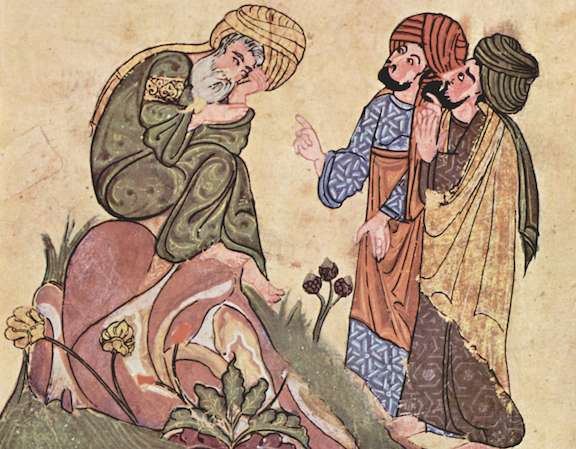Course Syllabus
 Plato's Academy. Mosaic (detail), First Century C.E., Pompeii (National Archeological Museum, Naples).
Plato's Academy. Mosaic (detail), First Century C.E., Pompeii (National Archeological Museum, Naples).
Course Description
This course provides an introduction to the history of philosophy in the Mediterranean world, from the time of its emergence as a distinct intellectual practice in intellectual practice in classical Greece. We read and discuss representative texts of ancient Greek and Roman philosophers ranging from Plato and Aristotle (both active in Athens in the fourth century B.C.E.), to Augustine of Hippo (a Christian of Roman Africa, born seven centuries later). The course concludes with a look at the impact of Greek philosophy on classical Islamic thought and the Christian Scholastics of the medieval period.
Course Organization and Requirements
Synchronous Seminar Sessions:
The course will meet weekly (via Zoom) on Tuesdays at 5 pm (Eastern Time). (Please note that there will be no course meeting on Tuesday, March 23.) These seminar sessions will typically run from 90 to 120 minutes, depending on the week's other course activities.
Asynchronous Teaching Components:
The seminar sessions will be supplemented with recorded audio lectures, and informal text-based discussion exercises on Canvas.
Formal Written Work:
Students write four short essays for the course. The first, 600-800 words in length, will be due on Friday, Feb. 5. The remaining three, 1200-1800 words each, will be due on March 5, April 23, and, May 10, respectively.
Grades:
Course Grades will be assessed on the following basis:
-
-
- Attendance & Participation in Synchronous Sessions: 10%
- Asynchronous Discussion Exercises: 20%
- Essays: 70%. (#1: 10%; #2-4: 20% each).
-
Course Readings
All readings for the course will be made available to students digitally, either as PDFs posted on this site or e-books through the Pratt library. Students wishing to obtain printed copies of the books will find them available for purchase through the Pratt online bookstore.
Office Hours:
Office hours, via Zoom, will be held on Thursdays from 4pm - 6pm, by appointment. Please make an appointment via the Calendar feature of Canvas. (You'll find a button labelled "Find Appointments" in the right-hand column of the Calendar page.) When making an appointment, please also be sure to notify me separately, via Canvas message or email. (If scheduling the appointment on the same day, please also notify me via text message.)
If you are unable to meet with me during the scheduled office hour times, please do not hesitate to get in touch with me to make an appointment at another time. I am also usually available to talk with students individually on Tuesday evenings after our class sessions.
COURSE OVERVIEW
Detailed information concerning reading and other assignments for each unit will be posted on the content page for each module, linked to this overview list.
|
|
|
|
 |
1/26 Apology |
|
 |
2/2 Gorgias 2/9 Gorgias 2/18 Phaedo |
2/5 (Fri): |
|
2/23 Physics, II.1-3, 7-9 |
|
|
|
3/2, 3/9, & 3/16 Nicomachean Ethics
|
3/12 (Fri): |
|
|
3/30, 4/6 & 4/13 Confessions |
4/23 (Fri): |
|
 |
4/20 Thomas Aquinas, Summa Contra Gentiles 4/27 John Duns Scotus, Ordinatio |
5/10 (Mon): |
Socrates and Two Disciples. Detail from early thirteenth-century (C.E.) illuminated manuscript of Abu al-Wafa' Al-Mubashsir ibn Fatik's Maxims and Aphorisms of the Sages, written in Egypt in 1049 (C.E.). (Topkapi Palace Museum, Istanbul).
Course Summary:
| Date | Details | Due |
|---|---|---|
